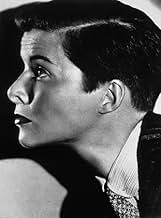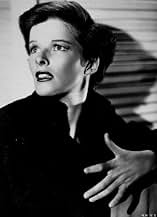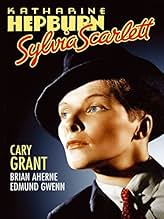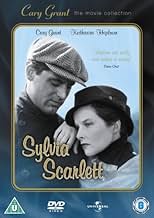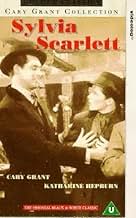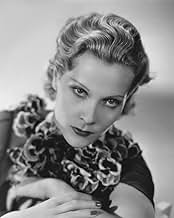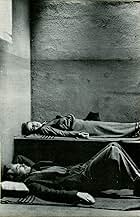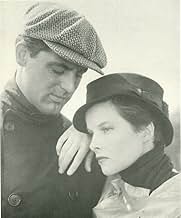IMDb RATING
6.2/10
4.8K
YOUR RATING
When her father decides to flee to England, young Sylvia Scarlett must become Sylvester Scarlett and protect her father every step of the way, with the questionable help of plenty others.When her father decides to flee to England, young Sylvia Scarlett must become Sylvester Scarlett and protect her father every step of the way, with the questionable help of plenty others.When her father decides to flee to England, young Sylvia Scarlett must become Sylvester Scarlett and protect her father every step of the way, with the questionable help of plenty others.
- Awards
- 1 win total
Robert Adair
- Turnkey
- (uncredited)
Bunny Beatty
- Maid
- (uncredited)
May Beatty
- Older Woman on Ship
- (uncredited)
Daisy Belmore
- Fat Woman on Beach
- (uncredited)
Carmen Beretta
- Woman
- (uncredited)
Nina Borget
- Minor Role
- (uncredited)
Thomas Braidon
- Minor Role
- (uncredited)
Elsa Buchanan
- Minor Role
- (uncredited)
Colin Campbell
- Minor Role
- (uncredited)
James Carlisle
- Park Scam Onlooker
- (uncredited)
Patricia Caron
- Minor Role
- (uncredited)
Harold Cheevers
- Bobby
- (uncredited)
E.E. Clive
- Customs Inspector
- (uncredited)
Edward Cooper
- Customs Inspector
- (uncredited)
Featured reviews
What a waste of talent due to a muddled script and some limp direction from George Cukor. Here we have KATHARINE HEPBURN (playing a boy, Sylvester, long before Streisand played Yentl!), CARY GRANT as a strolling player with a Cockney accent and BRIAN AHERNE as an unbelievably gullible artist bewitched by Hepburn.
None of the stars are at their peak here, perhaps unable to rise above a mediocre and baffling script. Hepburn, even with her slim frame and narrow face, never is believable as a young man and the masquerade is something we're forced to believe could have happened.
EDMUND GWENN is her n'er-do-well father who has to take to the road after he's accused of a crime, and Hepburn assumes a disguise as a boy so as to avoid capture. They join a traveling road show with CARY GRANT in charge, and from then on the plot takes a series of twists and turns involving BRIAN AHERNE and his eventual interest in Sylvia when she assumes her female counterpart. It's a cross-dressing tale best forgotten if you want to keep remembering Hepburn as a legendary star.
CARY GRANT is the only one who comes off at least believable in his Cockney role, but no one is really given material worthy of their talent and George Cukor has been unable to make anything out of the awkward script. Hepburn is simply embarrassing to watch.
Summing up: This offbeat comedy was obviously intended to be a charming romp for its three stars rather than the box-office flop that it was, to the extent that Hepburn was labeled "box-office poison" on the strength of this particular film.
A look at this film must have convinced David O. Selznick why Hepburn was never seriously considered for Scarlett O'Hara.
None of the stars are at their peak here, perhaps unable to rise above a mediocre and baffling script. Hepburn, even with her slim frame and narrow face, never is believable as a young man and the masquerade is something we're forced to believe could have happened.
EDMUND GWENN is her n'er-do-well father who has to take to the road after he's accused of a crime, and Hepburn assumes a disguise as a boy so as to avoid capture. They join a traveling road show with CARY GRANT in charge, and from then on the plot takes a series of twists and turns involving BRIAN AHERNE and his eventual interest in Sylvia when she assumes her female counterpart. It's a cross-dressing tale best forgotten if you want to keep remembering Hepburn as a legendary star.
CARY GRANT is the only one who comes off at least believable in his Cockney role, but no one is really given material worthy of their talent and George Cukor has been unable to make anything out of the awkward script. Hepburn is simply embarrassing to watch.
Summing up: This offbeat comedy was obviously intended to be a charming romp for its three stars rather than the box-office flop that it was, to the extent that Hepburn was labeled "box-office poison" on the strength of this particular film.
A look at this film must have convinced David O. Selznick why Hepburn was never seriously considered for Scarlett O'Hara.
SYLVIA SCARLETT (RKO Radio, 1935/released early January 1936), directed by George Cukor, and starring Katharine Hepburn, Cary Grant and Brian Aherne, is a movie that was somewhat ahead of its time. In the early 1970s during the so-called "nostalgia boom" era, I kept hearing about this being the worst Katharine Hepburn movie ever made. Because of that reputation, I became curious. Could it really be that bad? In a TV documentary about classic movies I saw many years ago, Hepburn was interviewed and said the majority of the theater patrons walked out long before the movie was over. Today it has gained a reputation as a "camp classic." Well, I finally got to watch this curious item for the first time on public television's WNET, Channel 13, in New York City in 1977 as part of the Katharine Hepburn Film Festival, which aired every Saturday night. After watching it, I kept wondering if this was supposed to be a comedy or drama. I guess a combination of both.
As for the plot, which opens in Paris, Henry Scarlett (Edmund Gwenn) commits larceny and takes off aboard ship with his daughter, Sylvia (Hepburn). To put the authorities off the track, she decides to cut her long hair and accompany him disguised as Scarlett's son, "Sylvester." They later meet up with a fast-talking swindler named Jimmy Monkley (Cary Grant) and travel with him around England like gypsies, making some easy money by cheating the public. Later, Sylvia, still disguised as Sylvester, encounters Michael Fane (Brian Aherne), an artist, and becomes interested in him, to later abandon her disguise to win him over.
Of the entire cast, Cary Grant comes off best in a very offbeat role, cockney accent and all, thus stealing every scene he's in. He even gets the closing shot sitting in a train compartment laughing himself silly after looking out the window and seeing Sylvia running off with Michael. Also in the cast are Natalie Paley as Lily, a Russian adventuress who tries to nab Henry Scarlett for herself, causing tragedy for him; and Dennie Moore as a daffy servant girl.
In spite of its reputation, SYLVIA SCARLETT is more interesting to see today because of the premise of a woman masquerading as a man/boy which pre-dates the more recent, VICTOR/VICTORIA (1982) with Julie Andrews. But let's not forget the 1933 MGM drama, QUEEN Christina in which Greta Garbo's character is mistaken for a young lad by an ambassador from Spain (John Gilbert), but at least that masquerade didn't go on for the entire movie. Unfortunately, Hepburn's version is an idea that might have looked good on paper, but not on screen. She does make a convincing boy, so to speak, in spite of her height, but I wonder how she felt about it years after it was made. A box office bomb at the time of its release, Hepburn and Grant did get to work together in screen again in three more comedies, BRINGING UP BABY (RKO, 1938), HOLIDAY (Columbia, 1938) and THE PHILADELPHIA STORY (MGM, 1940). SYLVIA SCARLETT, which formerly played on American Movie Classics prior to 2000, can be seen on Turner Classic Movies, or as a video/DVD rental. (**1/2)
As for the plot, which opens in Paris, Henry Scarlett (Edmund Gwenn) commits larceny and takes off aboard ship with his daughter, Sylvia (Hepburn). To put the authorities off the track, she decides to cut her long hair and accompany him disguised as Scarlett's son, "Sylvester." They later meet up with a fast-talking swindler named Jimmy Monkley (Cary Grant) and travel with him around England like gypsies, making some easy money by cheating the public. Later, Sylvia, still disguised as Sylvester, encounters Michael Fane (Brian Aherne), an artist, and becomes interested in him, to later abandon her disguise to win him over.
Of the entire cast, Cary Grant comes off best in a very offbeat role, cockney accent and all, thus stealing every scene he's in. He even gets the closing shot sitting in a train compartment laughing himself silly after looking out the window and seeing Sylvia running off with Michael. Also in the cast are Natalie Paley as Lily, a Russian adventuress who tries to nab Henry Scarlett for herself, causing tragedy for him; and Dennie Moore as a daffy servant girl.
In spite of its reputation, SYLVIA SCARLETT is more interesting to see today because of the premise of a woman masquerading as a man/boy which pre-dates the more recent, VICTOR/VICTORIA (1982) with Julie Andrews. But let's not forget the 1933 MGM drama, QUEEN Christina in which Greta Garbo's character is mistaken for a young lad by an ambassador from Spain (John Gilbert), but at least that masquerade didn't go on for the entire movie. Unfortunately, Hepburn's version is an idea that might have looked good on paper, but not on screen. She does make a convincing boy, so to speak, in spite of her height, but I wonder how she felt about it years after it was made. A box office bomb at the time of its release, Hepburn and Grant did get to work together in screen again in three more comedies, BRINGING UP BABY (RKO, 1938), HOLIDAY (Columbia, 1938) and THE PHILADELPHIA STORY (MGM, 1940). SYLVIA SCARLETT, which formerly played on American Movie Classics prior to 2000, can be seen on Turner Classic Movies, or as a video/DVD rental. (**1/2)
This is an odd film - definitely an odd one. Even in a period when the Hayes Office, the Breen Office, the movie code, and the Catholic Legion of Decency were still finding their feet, this film just stretched gender roles as far as possible. And the audiences of 1935, who tolerated MUTINY ON THE BOUNTY, THE INFORMER, and many other films, would not tolerate this one.
The issue is whether or not the audiences of 2006 would tolerate it. I gather that we are better used to bi-sexual, homosexual, or transsexual genres in movies in the last half century, but having said that I keep realizing that many people aren't. I also note that of the four Grant - Hepburn films this one is the least revived (which is odd, because it was the first one made). I have a feeling that the fans of this film fall into three categories: those who enjoy the sexual suggestiveness of it's storyline, those who enjoy the two stars and their acting abilities, and those who like the director, George Cukor. Outside those three groups, there are many people who are probably (at best) indifferent to this movie, and (at worst) positively hostile to it.
I could understand part of the hostility. It is the crazy screenplay in the film. This movie never comes to grips with exactly what it wants to do. It starts off with a kind of "Dr. Crippen" situation (though actually not as serious), wherein Edmund Gwenn has committed embezzlement and must flee France with his daughter Hepburn - whom he disguises as a son to help his own escape disguise (this resembles Crippen's disguising his girlfriend Ethel Le Neve as a son when fleeing to Canada on the "Montrose"). Hepburn just barely passes as a boy (her bony face just makes it). Then they meet grifter Cary Grant, and join him in a series of con games.
First problem in script here - if Gwenn and Hepburn are fleeing the French authorities to get to England, doesn't it undercut their efforts to continue a criminal path with Grant? If they are caught (as they nearly are) the British police will return Gwenn to France, rather than probably ignore him if he just behaves himself in England. Of course, for them to get into a story involving Grant the script requires them to behave in line with him.
This was the first film that Katherine Hepburn and Cary Grant appeared in together, and in the wake of the later Tracy series it has somehow gotten pushed slightly (not totally) into the shadows. It is similar to the series of musicals by Jeanette MacDonald and Maurice Chevalier for Paramount in the early 1930s, that are slightly (not quite totally) in the shadows of the later musical series with Nelson Eddy. The later films (particularly BRINGING UP BABY and THE PHILADELPHIA STORY) are far more popular - despite the screwiness of the former those films (and HOLIDAY) have coherent plots. We aren't trying to figure out if the film is funny or sad, or if it's about con artists or small time performers. We don't have to worry in the later three films about allegory (the scene in SCARLET when they are performing in Comedia del Arte costumes, with Gwenn - growing jealous about his girlfriend's activities - dressed as "Pierrot" is definitely allegorical). One can say SYLVIA SCARLET is a film with something for everyone - question is does that make it a good film?
Because I like George Cukor (who later would work with both Grant and Hepburn to better effect), and see that Hepburn and Grant and Brian Ahearn and Gwenn are giving their all to their parts, I am willing to say I'm favorably impressed enough to give this an "8" out of "10". But I will maintain that this odd little movie is not one meant for large audiences or for huge popular approval.
The issue is whether or not the audiences of 2006 would tolerate it. I gather that we are better used to bi-sexual, homosexual, or transsexual genres in movies in the last half century, but having said that I keep realizing that many people aren't. I also note that of the four Grant - Hepburn films this one is the least revived (which is odd, because it was the first one made). I have a feeling that the fans of this film fall into three categories: those who enjoy the sexual suggestiveness of it's storyline, those who enjoy the two stars and their acting abilities, and those who like the director, George Cukor. Outside those three groups, there are many people who are probably (at best) indifferent to this movie, and (at worst) positively hostile to it.
I could understand part of the hostility. It is the crazy screenplay in the film. This movie never comes to grips with exactly what it wants to do. It starts off with a kind of "Dr. Crippen" situation (though actually not as serious), wherein Edmund Gwenn has committed embezzlement and must flee France with his daughter Hepburn - whom he disguises as a son to help his own escape disguise (this resembles Crippen's disguising his girlfriend Ethel Le Neve as a son when fleeing to Canada on the "Montrose"). Hepburn just barely passes as a boy (her bony face just makes it). Then they meet grifter Cary Grant, and join him in a series of con games.
First problem in script here - if Gwenn and Hepburn are fleeing the French authorities to get to England, doesn't it undercut their efforts to continue a criminal path with Grant? If they are caught (as they nearly are) the British police will return Gwenn to France, rather than probably ignore him if he just behaves himself in England. Of course, for them to get into a story involving Grant the script requires them to behave in line with him.
This was the first film that Katherine Hepburn and Cary Grant appeared in together, and in the wake of the later Tracy series it has somehow gotten pushed slightly (not totally) into the shadows. It is similar to the series of musicals by Jeanette MacDonald and Maurice Chevalier for Paramount in the early 1930s, that are slightly (not quite totally) in the shadows of the later musical series with Nelson Eddy. The later films (particularly BRINGING UP BABY and THE PHILADELPHIA STORY) are far more popular - despite the screwiness of the former those films (and HOLIDAY) have coherent plots. We aren't trying to figure out if the film is funny or sad, or if it's about con artists or small time performers. We don't have to worry in the later three films about allegory (the scene in SCARLET when they are performing in Comedia del Arte costumes, with Gwenn - growing jealous about his girlfriend's activities - dressed as "Pierrot" is definitely allegorical). One can say SYLVIA SCARLET is a film with something for everyone - question is does that make it a good film?
Because I like George Cukor (who later would work with both Grant and Hepburn to better effect), and see that Hepburn and Grant and Brian Ahearn and Gwenn are giving their all to their parts, I am willing to say I'm favorably impressed enough to give this an "8" out of "10". But I will maintain that this odd little movie is not one meant for large audiences or for huge popular approval.
"Sylvia Scarlett" is like a screwball comedy that can't commit to being a screwball comedy.
Hepburn spends much of the first part of the film disguised as a boy so that she and her father (Edmund Gwenn), who are on the lam because of Gwenn's gambling debts, will be less conspicuous. They meet up with a Cockney shyster played by Cary Grant, who falls for Hepburn once he realizes she's actually a girl. Brian Aherne, playing a handsome gentleman the three come across during their travels, falls for her too. The finale involves a zany chase in which Hepburn and Aherne take off after Grant and Aherne's girlfriend in an attempt to get them back, only to discover once they've set off that they really like each other and don't much care about finding the disloyal lovers.
The fact that the film takes on gender issues at ALL makes it a curio worthy of interest, but just WHAT the film wants to do with those gender issues is never clear. Hepburn plays the character like a tomboy who's uncomfortable in her feminine skin, which is completely at odds with the girly girl she portrays in the film's very first scene. The film is never especially funny, but its overall tone is too lighthearted for the dramatic moments to make much of an impact. The editing is ragged and jumpy, which makes me wonder if the studio did some injudicious hacking, leaving elements that that would have made the film make more sense on the cutting room floor.
Critics and audiences have largely dismissed this film with an indifferent shrug, and I can't say that I blame them.
Grade: C
Hepburn spends much of the first part of the film disguised as a boy so that she and her father (Edmund Gwenn), who are on the lam because of Gwenn's gambling debts, will be less conspicuous. They meet up with a Cockney shyster played by Cary Grant, who falls for Hepburn once he realizes she's actually a girl. Brian Aherne, playing a handsome gentleman the three come across during their travels, falls for her too. The finale involves a zany chase in which Hepburn and Aherne take off after Grant and Aherne's girlfriend in an attempt to get them back, only to discover once they've set off that they really like each other and don't much care about finding the disloyal lovers.
The fact that the film takes on gender issues at ALL makes it a curio worthy of interest, but just WHAT the film wants to do with those gender issues is never clear. Hepburn plays the character like a tomboy who's uncomfortable in her feminine skin, which is completely at odds with the girly girl she portrays in the film's very first scene. The film is never especially funny, but its overall tone is too lighthearted for the dramatic moments to make much of an impact. The editing is ragged and jumpy, which makes me wonder if the studio did some injudicious hacking, leaving elements that that would have made the film make more sense on the cutting room floor.
Critics and audiences have largely dismissed this film with an indifferent shrug, and I can't say that I blame them.
Grade: C
An extremely unusual little film from director George Cukor makes the odd transition from caper comedy to coming of age romance - and occasionally teeters back and forth between the two. The film was a massive flop at the box office (in order to make amends for the film's failure, Cukor and star Katharine Hepburn reportedly offered to make their next film for free), and the audiences of thirties just didn't seem to understand film's bizarre juxtaposition between gritty depression-era realism and dreamy Hollywood surrealism. In all truth, however, the film is enormously entertaining when viewed today, and its unusual tone will be better appreciated by modern audiences.
Although this is the performance that led her to be labeled by critics and theater owners as "box office poison," Hepburn is delightful in role that was quite offbeat for the time (this was 48 years before Barbra Streisand donned male drag in YENTL). Brian Aherne also delivers an endearingly off-kilter performance as Sylvia's love interest, and Edmund Gwenn is terrific in the difficult role of Sylvia's father, who must balance humor and pathos at regular intervals. Best of all is Cary Grant who flat-out nails his role as a cockney con man, and simply radiates with wit, sex appeal, and macho charisma. He alone would make the film worth watching, but, on the whole, SYLVIA SCARLETT remains a lost gem that was very much ahead of its time.
Although this is the performance that led her to be labeled by critics and theater owners as "box office poison," Hepburn is delightful in role that was quite offbeat for the time (this was 48 years before Barbra Streisand donned male drag in YENTL). Brian Aherne also delivers an endearingly off-kilter performance as Sylvia's love interest, and Edmund Gwenn is terrific in the difficult role of Sylvia's father, who must balance humor and pathos at regular intervals. Best of all is Cary Grant who flat-out nails his role as a cockney con man, and simply radiates with wit, sex appeal, and macho charisma. He alone would make the film worth watching, but, on the whole, SYLVIA SCARLETT remains a lost gem that was very much ahead of its time.
Did you know
- TriviaHoward Hughes visited the set one day, landing his amphibious plane near the beach where they were filming. Hughes said he stopped by to say hello to his good friend Cary Grant but in actuality he wanted to meet Katharine Hepburn, with whom he was fascinated. The film The Aviator (2004) recreates this first meeting of theirs.
- GoofsWhen Sylvester yells for a cop outside the mansion, Henry gets left outside. Jimmy opens the door and pulls Henry in roughly. In doing so, Henry loses a shoe. Inside the mansion, Henry has both shoes, never having retrieved his shoe from outside.
- Quotes
Sylvia Scarlett: Well, we're all fools sometimes. Only you choose such awkward times.
- ConnectionsFeatured in The Men Who Made the Movies: George Cukor (1973)
- SoundtracksHello ! Hello ! Who's your Lady Friend ?
(uncredited)
Music by Harry Fragson
Lyrics by Worton David and Bert Lee (1914)
Sung by Cary Grant and Edmund Gwenn
- How long is Sylvia Scarlett?Powered by Alexa
Details
Box office
- Budget
- $641,000 (estimated)
- Runtime
- 1h 35m(95 min)
- Color
- Aspect ratio
- 1.37 : 1
Contribute to this page
Suggest an edit or add missing content

